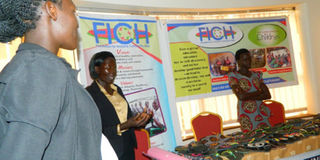Local NGOs give hope to conflict-affected girls

Ms Scovia Akech (2nd left ) , a beneficiary, shares her story in Gulu town on June 19. PHOTO BY BILL OKETCH
Lira- Ms Scovia Akech, 24, teaches pupils at Nimaro Education Centre, Ngai Sub-county in Oyam District.
Ms Akech, a Primary Five science teacher, thought her future plans had been altered by the Lord’s Resistance Army (LRA) insurgency when she was abducted in 2004 together with 25 other girls during an attack in Ngai Sub-county.
However, she escaped from the bush a year later.
“In 2014, I dropped out of school because of school fees but one organisation enrolled me onto their programme. I completed my education and I am a teacher,” she says.
Ms Akech’s story is similar to that of Rita Tabu, 23, who escaped with her brother from violence in South Sudan in 2002.
Tabu’s parents did not survive the war and sadly amidst the chaos, their first brother disappeared.
To this day, Tabu does not know whether her brother is still alive or not.
“After the death of our parents, our aunt was told to take care of the three of us [two boys and one girl]. Our first born brother was a brilliant student but keeping him in school was a challenge,” she says.
She adds: “He opened up a small business dealing in petrol by the road side when he was in Primary Two to make ends meet.”
Upon joining Primary Five, the young Sudanese boy eventually dropped out of school. “He became mentally unstable. Few months later, he disappeared until today,” Tabu says.
Tabu, then aged 11 sought refuge in a settlement camp in Uganda.
“I started selling ground nuts and roasted maize. I carried water, smeared people’s houses and used the money to pay my school fees,” she says.
Unfortunately, Tabu’s hard earned money was always taken away by her aunt. But for the past five years, Tabu’s story has changed, as she is among thousands of conflict-affected girls in Uganda currently being supported by Global Fund for Children under the Conflict Affected Girls’ Empowerment project.
The project is being implemented by Hope and Peace for Humanity, Children of the World Foundation, Foundation for Inclusive Community Help and Life Concern among others.
The organisations have been giving small grants to the girls to empower them economically to start their own businesses.
Other support
Those living in refugee camps have since transitioned from depending on handouts from relief agencies as they have been trained to make liquid soap which they sell out.
Education and entrepreneurship programmes have been established to impart knowledge and critical thinking in conflict-affected girls.
Peninah Karungi, 23, who in 2008 fled the Allied Democratic Forces insurgency in Kicwamba Parish, Bukuku Sub-county in Kabarole District with her father is optimistic that she will make it through.
“I lost my mother and younger brother during the insurgency. Our father suffered raising the four of us having sought refuge in Kasese,” she says.
She adds: “My father told me to first complete Senior Four before my other siblings could enrol. Having completed in 2011, I stayed home for two years and lost hope of ever seeing the blackboard again.”
But with support from the organisations, Ms Karungi did certificate in secretarial studies and unpon completion secured a job in a law firm.
“I used to earn Shs250, 000 per month and I worked for two years. I used part of the salary to help my father to pay rent,” she says.
The support offered
The non-governmental organisation offers startup capital to various girls who are out of school.
Some of the beneficiaries are using the money generated from businesses to educate their siblings.
Besides the financial and material support, the affected girls have been mentored and counselled which has improved their performance in school. They have also been presented opportunities to travel to various countries to share their experiences and success stories with other girls affected by conflict.
Mr Joseph Munyambanza, who has lived in a refugee camp in Uganda for 21 years, says refugees face a lot of barriers in accessing quality education and healthcare.
Mr Munyambanza says they established COBURAS International Youth Organisation (CIYOTA)) to Transform Africa in 2005 in an attempt to address some of the challenges faced by refugees.
A primary school has been established at Kyangwali refugee camp in Hoima District. “I know it has been a tough journey but the good thing is that all of us have learnt through this process and the Global Fund for Children is extremely proud of you for all that you’ve achieved,” Mr Emmanuel Otoo, Global Fund’s regional programme director for Africa and Middle East, said while meeting with partners in Gulu Town last Tuesday.




